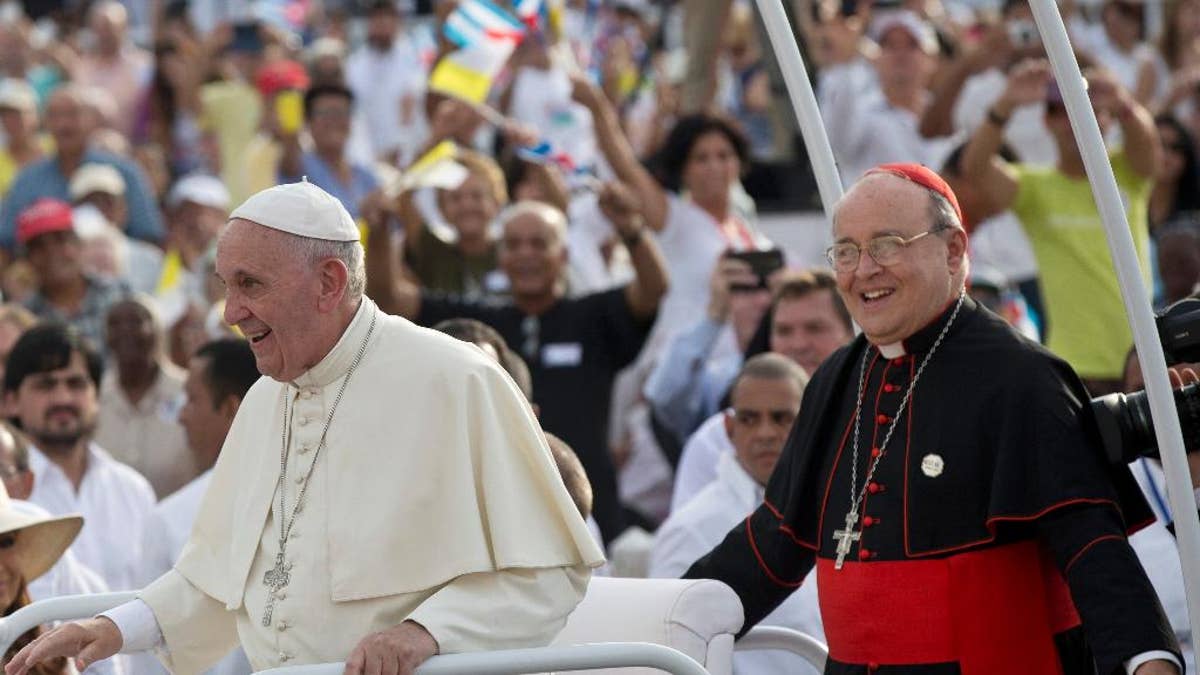
Cuba's Cardinal Jaime Ortega, right, stands behind Pope Francis in the popemobile as they arrive for Mass at Revolution Plaza in Havana, Cuba, Sunday, Sept. 20, 2015. During Mass Sunday, Ortega thanked the pope for his work promoting detente between Havana and Washington and called for reconciliation between Cubans living on the island and elsewhere. Ortega was among many priests sent to military-run agricultural camps in the 1960s after Fidel Castro declared Cuba to be socialist and accused prominent Catholics of trying to topple him. (Ismael Francisco/Cubadebate Via AP) (The Associated Press)
HAVANA – A look at Cuba's top Roman Catholic churchman, Cardinal Jaime Ortega, who at Mass on Sunday thanked Pope Francis for his work promoting detente between Havana and Washington and called for reconciliation between Cubans living on the island and elsewhere.
___
FULL NAME: Jaime Lucas Ortega y Alamino.
__
BORN: Oct. 18, 1936, in the sugar mill town of Jaguey Grande, in the central province of Matanzas. Moved to the provincial capital as a child.
___
TITLES: Cardinal, Archbishop of Havana.
___
EARLY BACKGROUND: Was among many priests sent to military-run agricultural camps in the 1960s after Fidel Castro declared Cuba to be socialist and accused prominent Catholics of trying to topple him.
___
CHURCH CAREER: Consecrated as bishop in 1979 and named Archbishop of Havana two years later. Helped rebuild church infrastructure around the capital and set up Caritas of Havana, the first office of the Catholic relief charity in the country. In November 1994, named by Pope John Paul II as Cuba's first cardinal in more than three decades. Has presided over the Cuban Catholic Church during a period of gradually easing tensions with the state, which began after Cuba dropped constitutional references to atheism in 1992. In 2010, Ortega sat down with President Raul Castro and negotiated the release of dozens of jailed dissidents, but critics accused Ortega of capitulating to the government when many were exiled to Spain instead of remaining in Cuba. Still, Ortega has authorized church publications to print articles by economists and intellectuals about Cuba's fiscal problems that would never have appeared in the state-run press.
___
THE CARDINAL AND THE POPE: Ortega and Francis are longtime friends, and it was the Cuban who revealed to the world the speech that then-Archbishop of Buenos Aires Jorge Mario Bergoglio delivered to a closed-door meeting of cardinals that largely convinced them to elect him pope in 2013.
With Francis' permission, Ortega published Bergoglio's notes in his archdiocesan newspaper soon after the conclave. In the speech, Francis called for the church to reform itself, to go out to the geographic and existential "peripheries" and to put an end to its self-referential "theological narcissism."







































